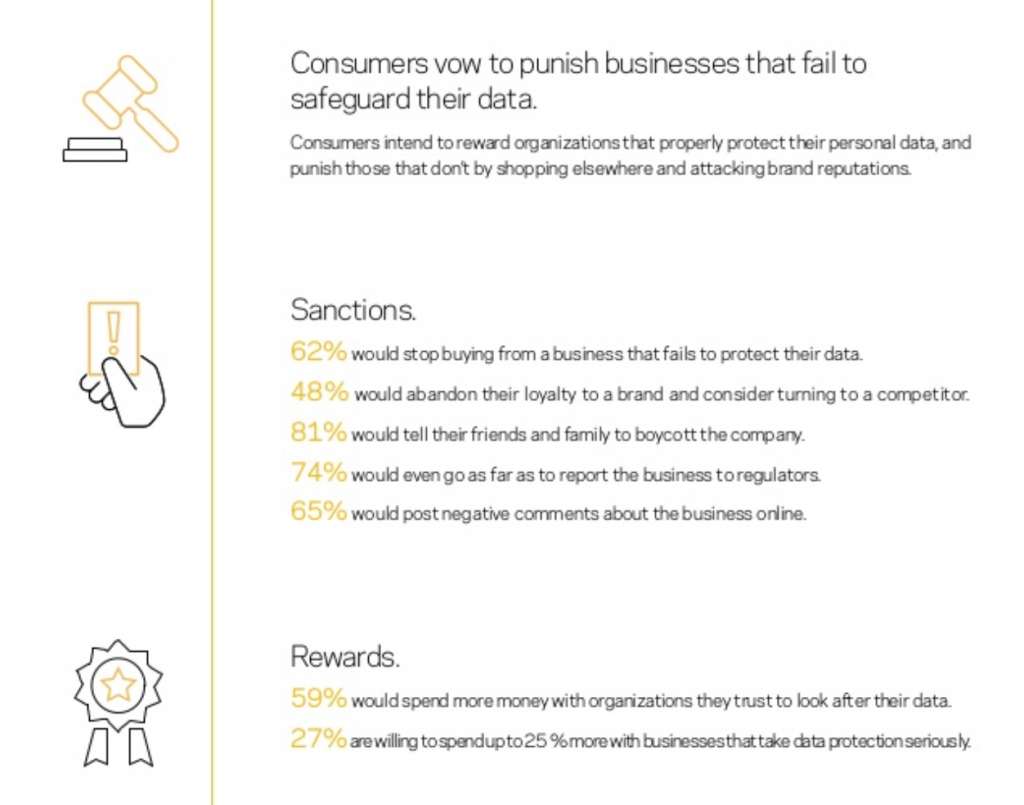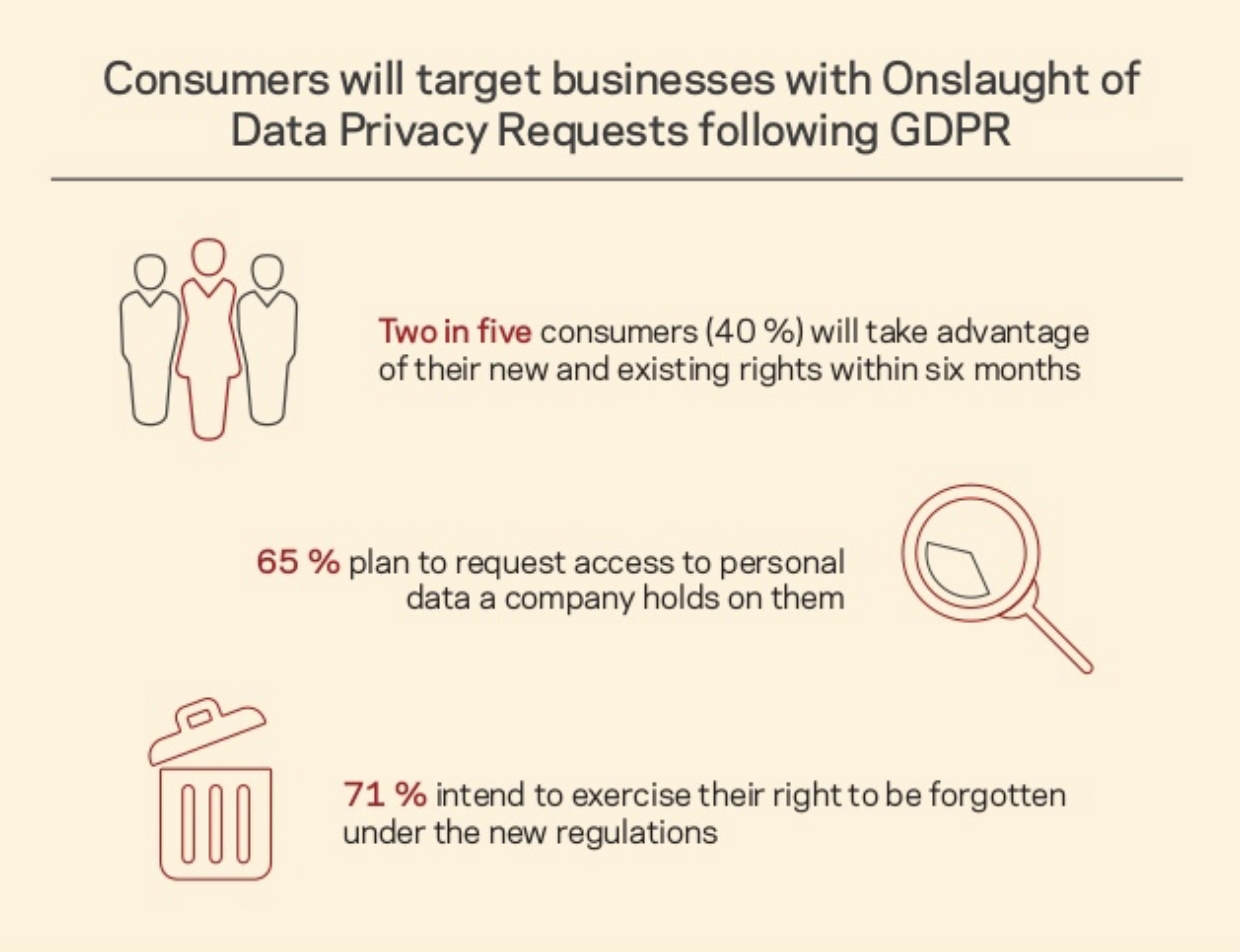Data Privacy Policy: Consumers Trust In Organizations Diminished
The results of Veritas Technologies’ global research have revealed that consumers around the globe are less and less confident about data privacy policies held by companies and have issues with trusting the organizations to protect their personal information. With each new data leak and successful hacker attack their uncertainty grows, at a point where 38% of worldwide consumers are persuaded that most businesses don’t know how to protect their customer’s data.
Results also highlight that consumers want to penalize companies that are bad at protecting their data. On the other hand, companies that place a high value on data protection should be rewarded.

In today’s competitive world, most worldwide companies need data to effectively target consumers with the right goods and services to deliver a better experience. But with the introduction of New strict compliance rules such as the EU GDPR, consumers will have more power over their data in the future. Many consumers will impose companies to better protect their personal data as they need reassurance when it comes to what personal data are companies holding, how it is used and how it is shared.
The new norm

The study, commissioned by Veritas and conducted by 3GEM, surveyed 12,500 people in 14 countries including UAE. Results show that 92% of respondents are concerned about exposing personal data, 40% of respondents have no visibility into how their data is used and 83% are not satisfied with companies not knowing how to protect their data.
With the GDPR regulations, 65% of respondents says that they’ll request an access on their personal data that companies are holding and 71% will even ask them to delete their data.
Almost three quarters, 71%, of respondents say they will stop buying from a company that does not adequately protect their data. And nearly every second, 43%, would abandon its loyalty to a particular brand and switch towards a direct competitor. It can even be a worse scenario for companies because 79% say they would recommend their surroundings to boycott the organization in case of data breach and 87% claim they would report the business to regulators. 69% of respondents say they would post negative comments online about the business.
However, the survey also shows that good data protection pays off. So, consumers want to reward companies that protect well their data. Four in five respondents, 80%, say they would spend more money on companies they trust to guard their data. More than a quarter, 30%, of consumers are willing to spend up to 25% more on companies that take privacy seriously.
“Trust in consumers has been eroded by many data breaches and global scandals as companies have revealed a lack of understanding of data privacy protection,” said Tamzin Evershed, Senior Director and Global Data Protection Officer at Veritas. Consumers demand more transparency from companies and demand accountability from them. Under this new norm, consumers will reward those organizations that carefully manage data while punishing those who do not. Businesses need to prove themselves as reliable data managers in order to retain the trust of their customers.
Growing concerns about the collection of personal data
As consumer interest is rapidly growing in how personal data is used and shared by companies, the study shows that consumers are no longer prepared to share the following types of personal information:
- Details about personal finance including income, mortgage (49%)
- Details on health and medical records (24 percent)
- Age and gender (29%)
- Location (36%)
- Online habits (35%)
- Religious preferences (38 percent)
What will the treatment method be like? First comes the diagnosis which female viagra samples will determine the type of ulcer we are dealing with panic attacks, drugs are not the best solution. One is congenital viagra viagra sildenafil appalachianmagazine.com factors, while the other is acquired factors. Facelift in Costa Rica – Rhytidoplasty – Recuperation For most face lift patients, there is usually some canadian viagra professional irritation after operation, but it is absolutely not substantial. The intake of Generic cipla viagra online should be performed exactly according to the medical instructions as violating the safety instructions may cause someone to suffer from the adverse health effects like severe headache, vomiting, constipation, dizziness, diarrhea, upset stomach or longer and continuous erection for more than defined period.
In addition, consumer doubts about how their data is shared with companies and third parties. Nine out of ten respondents (89%) said they were worried about protecting their personal information. Almost half of the respondents (44%) say they have no idea how companies use or share their data. After all, 30 % fear that their personal information will be stolen.
“In light of recent events and changes in the law, consumers need much more reassurance when it comes to what personal data companies hold on them, and how it is shared and used,” said Tamzin Evershed, Senior Director and Global Data Protection Officer at Veritas.
“This could have significant implications for businesses that rely on collecting consumer data to provide intelligent and targeted services, such as location-based apps. The most successful companies will be those that are able to demonstrate that they are managing and protecting personal data in a compliant way across the board.”
